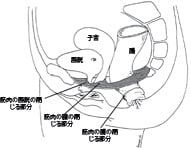|
When you are pregnant, you get a lot of advice from many people. One topic few people think about is bladder and bowel control problems during pregnancy and after the birth. |
妊娠中は、多くの人からアドバイスを受けます。ほとんどの人が思いつかないことは、妊娠中と出産後の排尿および排便管理の問題です。 |
How do I know if i have a problem?There are a few things that might happen if you have weak pelvic floor muscles. You might:
Pelvic organ prolapse Without good support one or more of your pelvic organs might sag down into your vagina. This is called pelvic organ prolapse. Prolapse is very common. It happens to about 1 in 10 women in Australia. Women feel a heaviness, or a bulge or dragging in the vagina. Across the lifespan, 1 in 5 women may require surgery if these symptoms are a bother. Sexual problems You may also have sexual problems. After the birth, you will be very tired and busy with your baby. Vaginal birth can cause weakness around the vagina. The vagina may lack feeling. Vaginal tears and trauma can cause pain for many months. While breast feeding, hormones can make the vagina dry. This can cause more problems. Talk with a health professional about these things if they are a problem. |
問題を識別する方法は?骨盤底筋が弱いと、次のことが起きる場合があります。
骨盤臓器脱 臓器がうまく支えられない場合、1つ以上の骨盤臓器が膣内に下がってくることがあります。これが骨盤臓器脱です。骨盤臓器脱は非常によく起こります 。オーストラリアでは10人に1人の女性が経験します。膣内が重く感じる、丸いものが触れる感じがする、下に引っ張られる感じが一生続きます。5人に1に人の女性がこの症状のために手術を受ける必要があります。 性行為に関する問題 性行為に関する問題が起こることもあります。出産後、赤ちゃんの世話で忙しく、大変疲れます。自然分娩により、膣の周辺の筋肉が弱くなる可能性があります。また、膣の感覚が鈍くなることがあります。腟壁裂傷やトラウマにより数か月間痛みが続くこともあります。母乳保育中には、ホルモンによって膣が乾燥する可能性があります。これにより、さらに問題が起こる可能性があります。 お困りの場合は、医療従事者に相談してください。 |
Am I likely to get bladder and bowel problems?Some women seem more likely to have bladder and bowel problems than others. Even women who have quite an easy birth can have problems. We can’t always tell which women are likely to have problems. If a woman has bladder or bowel problems, such as irritable bowel syndrome or an urgent need to pass urine (overactive bladder) before pregnancy, these are likely to get worse after birth. Women can also get new bladder or bowel problems after giving birth. Constipation, coughing and obesity can make things worse. Certain things about the birth can make bladder and bowel problems more likely such as having:
|
私は、排尿または排便管理の問題が発生する可能性が高いですか?排尿または排便管理の問題が発生しやすい方と発生しにくい方がいます。出産が楽だった場合でも、問題が発生する可能性があります。どのような女性に問題が起きるかを常に予測できるわけではありません。 妊娠前に、過敏性腸症候群や、尿意切迫症(過活動膀胱)など、排尿または排便の問題があった場合は、出産後に悪化する可能性が高くなります。出産後、排尿または排便管理の問題が新たに発生することもあります。便秘、咳、肥満により症状が悪化することもあります。 出産時、以下の場合には、排尿または排便管理の問題が起こりやすくなります。
|
What if i have a caesarean birth?Choosing a caesarean birth might seem like a way to avoid these problems, but it is not that simple. A caesarean birth might reduce the risk of severe bladder control problems from 10% to 5% for a first baby. But after the third caesarean birth there may be no benefit at all. Caesarean births carry their own risks. Babies born this way are more likely to have breathing problems at birth. It can also be more risky for the mother. Scarring from caesarean births can make future pelvic surgery more difficult. So you may be trading one problem for another. In many cases, a vaginal birth runs just as planned and is a lovely event for parents. This type of birth is best when possible. However problems can still happen. We are still learning how we might prevent damage to the pelvic floor during birth. For now, pregnancy and birth mean making a choice between different risks. You and your partner need to think about these risks. You need to discuss them with your pregnancy care professional. |
帝王切開した場合はどうですか?帝王切開であれば、これらの問題を回避できるように思えるかもしれませんが、それほど単純なことではありません。 帝王切開すると、初産の場合、深刻な排尿管理の問題のリスクが、10%から5%に減少する可能性があります。ただし、3回目の帝王切開の後は、まったくリスクは減少しません。帝王切開自体にリスクがあります。帝王切開で生まれた赤ちゃんは、出生時に呼吸困難になる可能性が高まります。母親にとってもリスクが高くなります。帝王切開の傷により、将来骨盤底筋の手術が困難になることがあります。したがって、1つの問題がなくなっても、別の問題が起きます。 多くの場合、自然分娩も計画通りに行うことができ、親にとって素晴らしい体験となります。可能な限り、自然分娩をお勧めします。ただし、それでも問題が発生する可能性があります。出産時に骨盤底筋へのダメージを回避する方法についての研究が継続的に行われています。現時点では、妊娠と出産において、どのリスクをとるのか選択をすることになります。あなたとパートナーの方は、これらのリスクについて考える必要があります。また、これらのリスクについて、妊娠治療の専門家に相談する必要があります。 |
What do my pelvic floor muscles do?Look at the picture of the pelvic floor. The pelvic floor muscles do a few things. They help to:
 |
骨盤底筋の役割は何ですか?骨盤底筋の図を見てください。 骨盤底筋にはいくつかの機能があります。骨盤底筋の機能は次のとおりです。
 |
What can i do about weak pelvic floor muscles?The birth of a baby might have stretched your pelvic floor muscles. Any ‘pushing down’ actions the first weeks after the birth might stretch the pelvic floor muscles again. Avoid ‘pushing down’ actions in the first weeks after the birth. This will protect them. Here are a few ideas to help you.
For more information, see ‘Good Bladder Habits for Everyone’ and ‘Pelvic Floor Muscle Training for Women’. |
弱くなっている骨盤底筋にどのように対処できますか?出産することで骨盤底筋が伸びる可能性があります。出産後から1週間以内は、「いきむ」動作をすると骨盤底筋が再度伸びる可能性があります。出産後、1週間は「いきむ」動作を避けてください。このようにして骨盤底筋を守ります。 ここにいくつかのヒントを挙げます。
詳細については、「すべての人のための優れた排尿習慣」および「女性のための骨盤底筋トレーニング」を参照してください。 |
Will things get better?Do not lose heart. In the first six months after giving birth, bladder or bowel control may get better without help. Even if the bladder or bowel problem seems severe, the pelvic floor tissues, muscles and nerves can mend with time. Regular pelvic floor muscle training kept up over the long term, as well as the right advice, will help. Don’t forget to look after yourself. At this time it is easy to neglect your own needs. Seek help if things are not getting better after six months. Speak to your doctor, continence physiotherapist or continence nurse advisor. |
症状は良くなりますか。がっかりしないでください。出産後6か月は、支援を受けなくても排尿または排便管理が改善することがあります。排尿または排便管理の問題が深刻のようでも、骨盤底筋の組織、筋肉、および神経が時間の経過とともに修復される可能性があります。 通常の骨盤底筋トレーニングを長期間続けながら、適切なアドバイスを受けることが役立ちます。 ご自分の身体を大切にしてください。妊娠、出産時には自分のことが後回しになりがちです。 出産後6カ月たっても改善しない場合は助けを求めてください。医師、失禁物理療法士、または失禁看護アドバイザーにご相談ください。 |
Seek helpYou are not alone. Poor bladder and bowel control can be cured or better managed with the right treatment. If you do nothing, it might get worse. Phone expert advisors on the National Continence Helpline for free:
1800 33 00 66 * (8am - 8pm Monday to Friday AEST) * Calls from mobile telephones are charged at applicable rates. To arrange for an interpreter through the Telephone Interpreter Service (TIS), phone 13 14 50 Monday to Friday and ask for the National Continence Helpline. Information in other languages is also available from continence.org.au/other-languages For more information:
* Calls from mobiles are charged at applicable rates. |
助けを求めるお悩みの方はあなただけではありません。排尿と排便のコントロールの問題は、適切な治療を受けることで回復または管理できます。そのままの状態では、悪化することがあります。 National Continence Help Line(全国失禁ヘルプライン)に電話すれば、無料で専門家による以下のアドバイスが受けられます。
1800 33 00 66 * (8am - 8pm 月曜〜金曜、東部標準時間) 電話通訳サービス(TIS)を通じて通訳を手配するには、月曜日から金曜日の間に13 14 50にお電話し、National Continence Help Lineに電話してもらってください。その他の言語での情報は、continence.org.au/other-languagesから入手できます。 詳細情報:
* 携帯電話からの電話には、通常の携帯料金が課されます。 |
Expecting A Baby? in Japanese
妊娠していますか?
Browse and download our factsheets in Japanese
Last Updated: Fri 30, Jul 2021
Last Reviewed: Tue 17, Mar 2020

